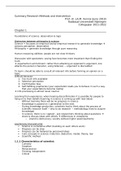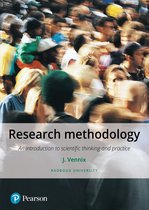Summary Research Methods and Intervention
Prof. dr. J.A.M. Vennix (June 2019)
Radboud Universiteit Nijmegen
Collegejaar 2021-2022
Chapter 1
Foundations of science: observation & logic
Distinction between philosophy & science
Science = focusses on empirical world/ empirical research to generate knowledge
sensory perception, observation
Philosophy = generate knowledge through pure reasoning
Human reasoning abilities: people are not clear thinkers
Discussion with spectators: saving face becomes more important than finding the
truth
argumentum ad hominem: rather than attacking an opponent’s argument, one
attacks the person (character, using fallacies) argument is discredited
To learn: should be able to consult all relevant info before forming an opinion on a
topic.
Difficult because:
1. Too much info available
2. Selective perception
3. Confirmation bias
4. Self-fulfilling prophecies (your expectation leads you to behave in such a way
that your expectations become reality)
info processing is almost never neutral
Learning from experience: when hearing disconfirmation it is possible for people to
hang on to their beliefs (learning in science is coming up with new ideas)
- Without learning there will be no progress in science
- Knowledge is passed on 1 generation to the next
- During knowledge production, scientists had to think about the process of
scientific research itself why to do research methodology (how to acquire
knowledge)
- In science, there is no ‘captain’, just researchers thinking about questions
share & discuss ideas with others differences in viewpoints
o Anarchic-democracy: society without higher power/authority
Learning by trial and error
Science is cumulative effort (building on each others work)
Progress can be slow
Progress can be haltered by perceived ideas
Core concepts in science: induction, deduction, model, theory, law
Scientific method
1.1.1 Characteristics of scientist:
- Curiosity
- Sceptism
- Perseverance
- Thinking independent
- Critical
, - Produce coherent arguments (not based on emotion)
Chapter 2
2 types of knowning:
1. Descriptive (what is the case?)
2. Explanatory (why this is the case?)
3 general strategies to generate knowledge (Aristotle):
1. Induction
2. Deduction
3. Abduction
2.1.1 Deduction
Deductive logic = from universal to individual
Validity: logical correctness of an argument
Valid: in correspondence with (empirical) reality
Material implication: p implies q / if p then q modus ponens
Denying the antecedent
- If p then q
- Not p
- Therefore not q
Affirming the consequent
- If p then q
- Q
- Therefore p
fallacious argument
non sequitur: it does not follow
P considered to be a necessary condition rather than a sufficient one
Axioma = een niet bewezen, maar als grondslag aanvaarde bewering
2.1.2 Induction
Inductive logic = observing a set of empirical phenomena to a general statement
(going from specific to general)
- Complete induction
- Incomplete induction
Induction problem: new knowledge is added but we don’t know if the conclusion is
true
Inductive sciences: relies heavenly on observation of empirical phenomena while
observing finding patterns/regularities
Induction problems
1. Frank/unprejudiced observation (human observations are influenced in
various ways)
2. Misunderstanding that through induction, hypotheses to explain phenomena
will more or less automatically surface
Induction itself (observing reality) will not generate hypothesis directly
2.1.3Abduction
Aristotle: retroduction Peirce abduction
Abduction = creating a hypothesis which can explain an empirical phenomenon
(might be 2 competing hypotheses)
,2.1.4. Context of discovery and context of justification
Complete induction: assess all possible units of measurement
Bounded rationality: the way that humans make decisions that departs from perfect
economic rationality, because our rationality is limited by our thinking capacity, the
information that is available to us, and time. Instead of making the 'best' choices, we
often make choices that are satisfactory
3 forms of acquisition of knowledge
1. Deduction (conclusions follow logically from premises, it does not give rise to
new knowledge: conclusion is enclosed in the premises
1.1. Hypothesis are derived from a theory and tested against empirical data
2. Induction (observing reality), you make your own theory
3. Abduction
Abduction = creating a hypothesis (vermoeden) which can explain an emperical
phenomenon
- Trying to find a hypothesis which can explain the observed motions of the
planets
Context of discovery: situation in which ideas and hypotheses are generated, which
should explain certain phenomena
Context of justification: to the situation in which ideas (hypotheses) theories are
tested against logic and/or empirical evidence
Selecting appropriate hypotheses:
Ockham’s razor = if we have two explanations for the same phenomenon, we
should always choose the simpler of the two, because simpler solutions are more
likely to be correct
Parsimoniousness = choose the simplest scientific explanation that fits the
evidence
Serendipity (toevalstreffer) = being fortunate to make an unexpected discovery
2.2. Core concepts in science
5 core concepts in science:
1. Model
2. Law
3. Experiment
4. Hypothesis
5. Theory
2.2.1 Model
Model = simplified representation of a certain phenomenon, it is also visable
- Implicit models: mental models of the world around us, you are not aware of
them
- Explicit models
o Conceptual
Verbal: text
Schematic: paper models of the solar system
Mathematical: excel
o Physical: maquette
2.2.2. Law
Law = has everything to do with patterns and regularities which are the result of
systematic observation in the inductive sciences
- Normative: prescribe what should and should not be done
, - The establishing concept of law: empirical concept, based on observation one
establishes a certain pattern or regularity in empirical data
2.2.3. Experiment
Experiment = artificial research setting, created for the purpose of testing
hypotheses (opposite of pure observating things in their natural context)
- What you observe in an experiment: result of a situation which is deliberately
created to serve a purpose
2.2.4. Hypothesis
Hypothesis in context of abduction: finding a hypothesis which can explain the
observed phenomena
- Working assumption/hypothesis: when thinking of a conjecture frequently it
becomes a hypothesis: let us assume that this was indeed the case.. =
preliminary stage of theory
- Consequence of a theory: a hypothesis which can be directly tested against
empirical reality (p q: if conditions of kind C are realized, then an event of
kind E will occur)
2.2.5. Theory
Theory = coherent and consistent set of statements, incorporating concepts, which
describe and explain certain phenomena
- Theory is supposed to explain certain phenomena (hypothesis must do the
same)
- It explains the why
- Theory is a thought construction which attempts to explain a large number of
empirical regularities by postulating certain mechanisms, which themselves
are not observable
- From a theory you can draw conclusions these conclusions can be tested
empirically
- Theory should have as little concepts as possible and it should have a large
scope
2.3. scientific revolution
Ptolemy, Copernicus, Kepler, Galileo, Newton = scientific revolution because there
was a dramatic change in the way scientific knowledge was acquired
scientific method
1. Observe a pattern (induction)
2. Come up with hypotheses, which can explain the observed phenomenon
(abduction)
3. Test hypotheses systematically (deduction)
4. Through deductive reasoning you derive the test implication from the
hypothesis
5. Carrying out an experiment to produce test outcome
6. Conclusions
Chapter 3
Criterion of demarcation = what kind of statements/propositions should an
empirical science engage with
Ontology: is the philosophical study of the nature of being, becoming, existence, or
reality. Questions about what things exist or can be said to exist, and how such
entities can be grouped according to similarities and differences
Epistemology: the philosophical study of the nature, origin, and limits of human
knowledge (science of knowing)
3.1 Logical positivism
Comte





